1. Lin W, Lin M, Zhou H, Wu H, Li Z, Lin W. The effects of chemical and organic fertilizer usage on rhizosphere soil in tea orchards. PLoS One. 2019 May 28;14(5):e0217018. doi: 10.1371/journal.pone.0217018. PMID: 31136614; PMCID: PMC6538140. [cited 2023 Feb 24]
2. López-Muñoz F, Alamo C. Monoaminergic neurotransmission: the history of the discovery of antidepressants from 1950s until today. Curr Pharm Des. 2009;15(14):1563-86. doi: 10.2174/138161209788168001. PMID: 19442174.[cited 2023 Feb 24]
3. Ganzel B, Reinhardt C, Wessels Living History Farm, The Postwar Fertilizer Industry Explodes[cited 2023 Feb 24]
4. Muscaritoli M. The Impact of Nutrients on Mental Health and Well-Being: Insights From the Literature. Front Nutr. 2021 Mar 8;8:656290. doi: 10.3389/fnut.2021.656290. PMID: 33763446; PMCID: PMC7982519. [cited 2023 Feb 24]
5. Ljungberg T, Bondza E, Lethin C. Evidence of the Importance of Dietary Habits Regarding Depressive Symptoms and Depression. Int J Environ Res Public Health. 2020 Mar 2;17(5):1616. doi: 10.3390/ijerph17051616. PMID: 32131552; PMCID: PMC7084175. [cited 2023 Feb 24]
6. Safer DJ. Overprescribed Medications for US Adults: Four Major Examples. J Clin Med Res. 2019 Sep;11(9):617-622. doi: 10.14740/jocmr3906. Epub 2019 Sep 1. PMID: 31523334; PMCID: PMC6731049. [cited 2023 Feb 24]
7. Mayo-Wilson E, Dias S, Mavranezouli I, Kew K, Clark DM, Ades AE, Pilling S. Psychological and pharmacological interventions for social anxiety disorder in adults: a systematic review and network meta-analysis. Lancet Psychiatry. 2014 Oct;1(5):368-76. doi: 10.1016/S2215-0366(14)70329-3. Epub 2014 Oct 7. PMID: 26361000; PMCID: PMC4287862. [cited 2023 Feb 24]
8. NIH authors Anxiety Disorder [published online N.D.] [cited 2023 Feb 24]
9. Faraone SV. Interpreting estimates of treatment effects: implications for managed care. P T. 2008 Dec;33(12):700-11. PMID: 19750051; PMCID: PMC2730804. [cited 2023 Feb 24]
10. FDA Medwatch: The FDA Safety Information and Adverse Event Reporting Progam [published online N.D.] [cited 2023 Feb 24]
11. FDA Safety Report Benzodiazepine Drug Class: Drug Safety Commission – Boxed Warning Updated to Improve Safe Use [published 09.23,2023] [cited 2023 Feb 24]
12. Adjibade M, Lemogne C, Julia C, Hercberg S, Galan P, Assmann KE, Kesse-Guyot E. Prospective association between adherence to dietary recommendations and incident depressive symptoms in the French NutriNet-Santé cohort. Br J Nutr. 2018 Aug;120(3):290-300. doi: 10.1017/S0007114518000910. Epub 2018 May 23. PMID: 29789039. [cited 2023 Feb 24]
13. Zhang FF, Barr SI, McNulty H, Li D, Blumberg JB. Health effects of vitamin and mineral supplements. BMJ. 2020 Jun 29;369:m2511. doi: 10.1136/bmj.m2511. PMID: 32601065; PMCID: PMC7322674. [cited 2023 Feb 24]
14. Firth J, Teasdale SB, Allott K, Siskind D, Marx W, Cotter J, Veronese N, Schuch F, Smith L, Solmi M, Carvalho AF, Vancampfort D, Berk M, Stubbs B, Sarris J. The efficacy and safety of nutrient supplements in the treatment of mental disorders: a meta-review of meta-analyses of randomized controlled trials. World Psychiatry. 2019 Oct;18(3):308-324. doi: 10.1002/wps.20672. PMID: 31496103; PMCID: PMC6732706. [cited 2023 Feb 24]
15. Montgomery DR, Biklé A, Archuleta R, Brown P, Jordan J. Soil health and nutrient density: preliminary comparison of regenerative and conventional farming. PeerJ. 2022 Jan 27;10:e12848. doi: 10.7717/peerj.12848. PMID: 35127297; PMCID: PMC8801175. [cited 2023 Feb 24]
16. Long SJ, Benton D. Effects of vitamin and mineral supplementation on stress, mild psychiatric symptoms, and mood in nonclinical samples: a meta-analysis. Psychosom Med. 2013 Feb;75(2):144-53. doi: 10.1097/PSY.0b013e31827d5fbd. Epub 2013 Jan 29. PMID: 23362497. [cited 2023 Feb 24]
17. Huang Z, Liu Y, Qi G, Brand D, Zheng SG. Role of Vitamin A in the Immune System. J Clin Med. 2018 Sep 6;7(9):258. doi: 10.3390/jcm7090258. PMID: 30200565; PMCID: PMC6162863. [cited 2023 Feb 24]
18. Mahdavifar B, Hosseinzadeh M, Salehi-Abargouei A, Mirzaei M, Vafa M. Dietary intake of B vitamins and their association with depression, anxiety, and stress symptoms: A cross-sectional, population-based survey. J Affect Disord. 2021 Jun 1;288:92-98. doi: 10.1016/j.jad.2021.03.055. Epub 2021 Mar 26. PMID: 33848753. [cited 2023 Feb 24]
19. Peechakara BV, Gupta M. Vitamin B2 (Riboflavin) [Updated 2022 May 20]. In: StatPearls [Internet]. Treasure Island (FL): StatPearls Publishing; 2022 Jan-. Available from: https://www.ncbi.nlm.nih.gov/books/NBK525977/< [cited 2023 Feb 24]
20. Lanska DJ. Chapter 30: historical aspects of the major neurological vitamin deficiency disorders: the water-soluble B vitamins. Handb Clin Neurol. 2010;95:445-76. doi: 10.1016/S0072-9752(08)02130-1. PMID: 19892133. [cited 2023 Feb 24]
21. Calderon-Ospina CA, Nava-Mesa MO, Paez-Hurtado AM. Update on Safety Profiles of Vitamins B1, B6, and B12: A Narrative Review. Ther Clin Risk Manag. 2020 Dec 22;16:1275-1288. doi: 10.2147/TCRM.S274122. PMID: 33376337; PMCID: PMC7764703. [cited 2023 Feb 24]
22. Schwarz G, Belaidi AA. Molybdenum in human health and disease. Met Ions Life Sci. 2013;13:415-50. doi: 10.1007/978-94-007-7500-8_13. PMID: 24470099. [cited 2023 Feb 24]
23. Hoffer, A, Megavitamin B-3 Therapy for Schizophrenia Canadian Journal of Psychiatry Volume 16, issue 6, 1971 [published online April 2017) [cited 2023 Feb 24]
24. Sim M, Hong S, Jung S, Kim JS, Goo YT, Chun WY, Shin DM. Vitamin C supplementation promotes mental vitality in healthy young adults: results from a cross-sectional analysis and a randomized, double-blind, placebo-controlled trial. Eur J Nutr. 2022 Feb;61(1):447-459. doi: 10.1007/s00394-021-02656-3. Epub 2021 Sep 2. PMID: 34476568; PMCID: PMC8783887. [cited 2023 Feb 24]
25. Plevin D, Galletly C. The neuropsychiatric effects of vitamin C deficiency: a systematic review. BMC Psychiatry. 2020 Jun 18;20(1):315. doi: 10.1186/s12888-020-02730-w. PMID: 32552785; PMCID: PMC7302360. [cited 2023 Feb 24]
26. Briguglio M, Vitale JA, Galentino R, Banfi G, Zanaboni Dina C, Bona A, Panzica G, Porta M, Dell’Osso B, Glick ID. Healthy Eating, Physical Activity, and Sleep Hygiene (HEPAS) as the Winning Triad for Sustaining Physical and Mental Health in Patients at Risk for or with Neuropsychiatric Disorders: Considerations for Clinical Practice. Neuropsychiatr Dis Treat. 2020 Jan 8;16:55-70. doi: 10.2147/NDT.S229206. PMID: 32021199; PMCID: PMC6955623. [cited 2023 Feb 24]
27. Holick MF. The vitamin D deficiency pandemic: Approaches for diagnosis, treatment and prevention. Rev Endocr Metab Disord. 2017 Jun;18(2):153-165. doi: 10.1007/s11154-017-9424-1. PMID: 28516265. [cited 2023 Feb 24]
28. Medina J, Gupta V. Vitamin E. [Updated 2022 May 13]. In: StatPearls [Internet]. Treasure Island (FL): StatPearls Publishing; 2022 Jan-. Available from: https://www.ncbi.nlm.nih.gov/books/NBK557737/ [cited 2023 Feb 24]
29. Lewis JE, Poles J, Shaw DP, Karhu E, Khan SA, Lyons AE, Sacco SB, McDaniel HR. The effects of twenty-one nutrients and phytonutrients on cognitive function: A narrative review. J Clin Transl Res. 2021 Aug 4;7(4):575-620. PMID: 34541370; PMCID: PMC8445631. [cited 2023 Feb 24]
30. Maresz K. Growing Evidence of a Proven Mechanism Shows Vitamin K2 Can Impact Health Conditions Beyond Bone and Cardiovascular. Integr Med (Encinitas). 2021 Aug;20(4):34-38. PMID: 34602875; PMCID: PMC8483258. [cited 2023 Feb 24]
31. McEldrew EP, Lopez MJ, Milstein H. Vitamin A. 2022 Jul 11. In: StatPearls [Internet]. Treasure Island (FL): StatPearls Publishing; 2022 Jan–. PMID: 29493984. [cited 2023 Feb 24]
32. Hanna M, Jaqua E, Nguyen V, Clay J. B Vitamins: Functions and Uses in Medicine. Perm J. 2022 Jun 29;26(2):89-97. doi: 10.7812/TPP/21.204. Epub 2022 Jun 17. PMID: 35933667; PMCID: PMC9662251. [cited 2023 Feb 24]
33. NIH Health Professional Fact Sheet Vitamin C [published online Mar 26, 2021] [cited 2023 Feb 24]
34. Lamberg-Allardt C. Vitamin D in foods and as supplements. Prog Biophys Mol Biol. 2006 Sep;92(1):33-8. doi: 10.1016/j.pbiomolbio.2006.02.017. Epub 2006 Feb 28. PMID:16618499. [cited 2023 Feb 24]
35. Lehmann J, Martin HL, Lashley EL, Marshall MW, Judd JT. Vitamin E in foods from high and low linoleic acid diets. J Am Diet Assoc. 1986 Sep;86(9):1208-16. PMID: 3745745. [cited 2023 Feb 24]
36. Booth SL. Vitamin K: food composition and dietary intakes. Food Nutr Res. 2012;56. doi: 10.3402/fnr.v56i0.5505. Epub 2012 Apr 2. PMID: 22489217; PMCID: PMC3321250. [cited 2023 Feb 24]

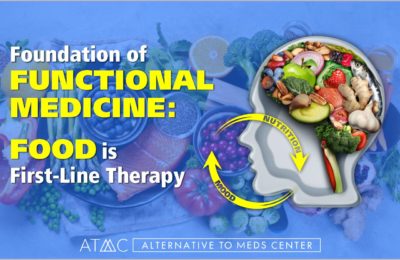 Is there a connection between declining mental health globally and declining nutrition? Some key data points stand out like beacons in a storm taken from the International Journal of Environmental Research and Public Health.5 Additional studies report similar observations, as found in the Journal of World Psychiatry, the Peer Journal, and the British Journal of Nutrition.12-15 Consider these facts reported in the medical literature:
Is there a connection between declining mental health globally and declining nutrition? Some key data points stand out like beacons in a storm taken from the International Journal of Environmental Research and Public Health.5 Additional studies report similar observations, as found in the Journal of World Psychiatry, the Peer Journal, and the British Journal of Nutrition.12-15 Consider these facts reported in the medical literature: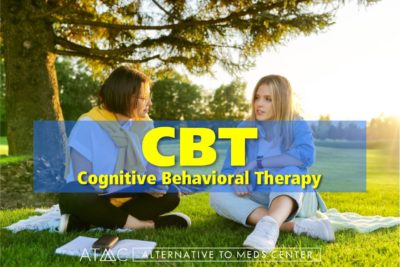 After comparing the SMD scores from all these classes of interventions, results showed that individual CBT (a popular and practical form of talk therapy that devises better ways to manage stress triggers) generally outperformed all the above-mentioned classes of drug therapy. The Lancet review also noted the advantage of eliminating adverse drug side effects often reported in connection with pharmacological treatments. The problem of drug-induced adverse reactions is formally recognized as being so significant that the FDA has set up a website called “Medwatch” for doctors and patients to report such adverse drug effects.10 From such reports, the FDA can initiate drug recalls, issue “black box” warnings, or modify prescribing guidelines for specific drugs. MedWatch reports make up a comprehensive, long-term body of data on drug side effects.11
After comparing the SMD scores from all these classes of interventions, results showed that individual CBT (a popular and practical form of talk therapy that devises better ways to manage stress triggers) generally outperformed all the above-mentioned classes of drug therapy. The Lancet review also noted the advantage of eliminating adverse drug side effects often reported in connection with pharmacological treatments. The problem of drug-induced adverse reactions is formally recognized as being so significant that the FDA has set up a website called “Medwatch” for doctors and patients to report such adverse drug effects.10 From such reports, the FDA can initiate drug recalls, issue “black box” warnings, or modify prescribing guidelines for specific drugs. MedWatch reports make up a comprehensive, long-term body of data on drug side effects.11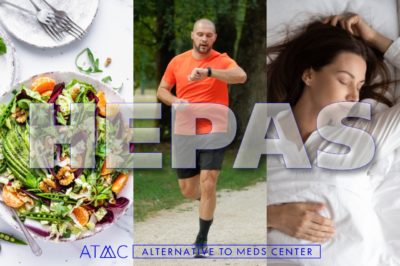 The 2020 Journal of Neuropsychiatric Disease Treatment refers to the “winning triad” consisting of healthy eating, physical activity, and improved sleep hygiene (HEPAS) which has reciprocal, measurable positive effects on mental health.26 Authors Bruguglio et al encourage more use of HEPAS in clinical, hospital, and other treatment settings due to their unquestionable efficacy. So we see that drug therapy has a curiously predominant status in mental health treatment when compared to other non-drug protocols with documented superior efficacy. Here we will focus on one leg of the HEPAS triad, the therapeutic use of nutrition and supplementation.
The 2020 Journal of Neuropsychiatric Disease Treatment refers to the “winning triad” consisting of healthy eating, physical activity, and improved sleep hygiene (HEPAS) which has reciprocal, measurable positive effects on mental health.26 Authors Bruguglio et al encourage more use of HEPAS in clinical, hospital, and other treatment settings due to their unquestionable efficacy. So we see that drug therapy has a curiously predominant status in mental health treatment when compared to other non-drug protocols with documented superior efficacy. Here we will focus on one leg of the HEPAS triad, the therapeutic use of nutrition and supplementation.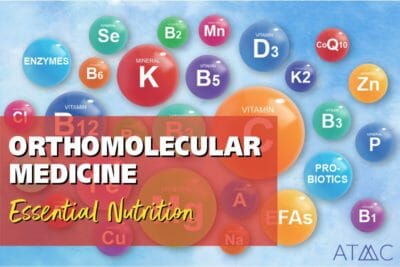 Vitamin B-complex
Vitamin B-complex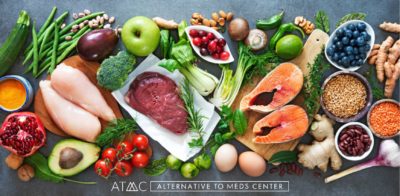 Vitamin A
Vitamin A Alternative to Meds Center for mental health and recovery blends a
Alternative to Meds Center for mental health and recovery blends a 







